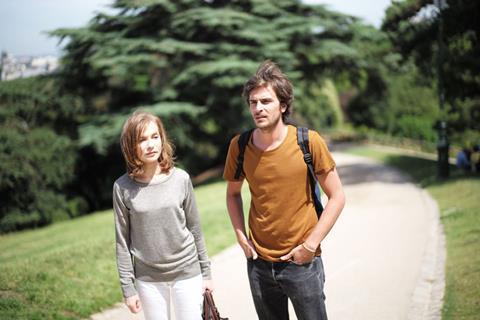Dir. Mia Hansen-Løve. France, Germany. 2016. 100 mins.

Any film which name-drops philosophers and credos with the casual profligacy shown by Mia Hansen-Løve’s Things To Come (L’Avenir) walks a precarious line. At best, it could alienate some of its potential audience; at worst it runs the risk of being dismissed as insufferably pretentious. It’s to the credit of Isabelle Huppert, who excels in the role of philosophy teacher Nathalie, and to the deft handling by Hansen-Løve that the film wears its wealth of ideas so lightly.
One of the pleasures of Hansen-Løve’s screenplay is that fact that it resists obvious scenes.
Hansen-Løve’s films have been compared to those of Eric Rohmer on previous occasions, but with this bracingly intelligent and satisfying collage of moments from a life, she is beginning to look like his creative heir. Things To Come is a genuine rarity: a film which allows a middle-aged female protagonist to find fulfilment within herself rather than in the arms of a man. This, coupled with an engaging, often funny, performance from the peerless Huppert, should help the picture connect with an enthusiastic arthouse audience.
There’s an easiness to Nathalie’s relationship with her family; her marriage to Heinz (André Marcon) is unshowy and comfortable, like a well-worn cardigan. The marriage is the only thing about Nathalie that isn’t constantly on the move. Denis Lenoir’s camerawork is as restless and brisk as the film’s vital central character.
Nathalie juggles the demands of her job – she teaches, writes textbooks and mentors her favourite former pupil, Fabien (Roman Kolinka) – with those of her highly-strung mother Yvette. Edith Scob is a treat in this part, nervy as a greyhound and prone to calling the fire brigade when the Xanax fails to take the edge off her panic attacks.
One of the pleasures of Hansen-Løve’s screenplay is that fact that it resists obvious scenes. We learn about Heinz’s infidelity not by following him to an assignation, but through a gentle exchange with his daughter. She points out that he needs to make a choice, and soon. He chooses to leave Nathalie. This, coupled with the death of her mother and her children leaving home, means that Nathalie is suddenly confronted by daunting expanses of freedom.
Nathalie mourns the books she lost in their literary custody battle and the memories locked away in the holiday home she will never visit again. But of Heinz, she wryly observes, “I’m taking it very well.”
Hansen-Løve allows her character the mental fortitude to grow into her new freedom, her new future. Hauling her late mother’s obese and rather charmless cat with her, she visits Fabien at the anarchist collective where he lives. She fields off the amorous advances of a stranger in a cinema. She embraces her new role as a grandmother. And it’s then, with her baby grandson in her arms while her children eat Christmas dinner, that Nathalie is finally still, for a moment at least.
Production company: CG Cinéma
International sales: Les Films Du Losange b.vincent@filmsdulosange.fr
Producer: Charles Gillibert
Screenplay: Mia Hansen-Løve
Cinematography: Denis Lenoir
Editor: Marion Monnier
Production design: Anna Falguères
Main cast: Isabelle Huppert, André Marcon, Roman Kolinka, Edith Scob, Sarah Le Picard
























